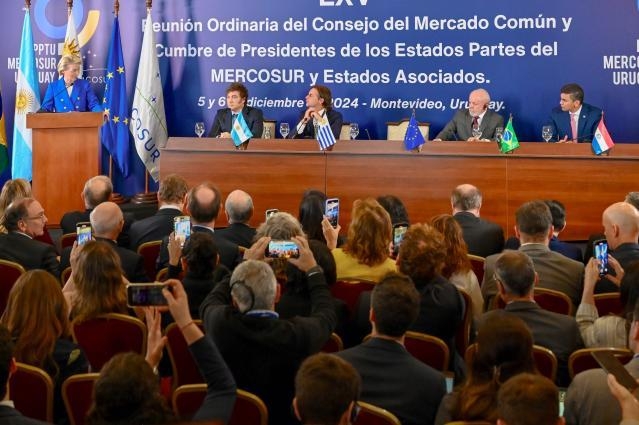
After more than twenty years of negotiations, the European Union and the Mercosur countries (Argentina, Brazil, Paraguay, and Uruguay) have finally reached a trade agreement, which has been hailed as a “historic milestone” in trade relations between the two regions. In this context, European Commission President Ursula von der Leyen emphasized that the agreement is “ambitious and balanced,” and celebrated that it will open new markets and strengthen economic cooperation between both parties.
This agreement will impact a total of 780 million people and will include the gradual elimination of tariffs, which will result in an annual saving of about €4 billion for European companies. However, the agreement may generate obstacles that primary sector producers in Europe , such as reduced quality guarantees and increased permits for the circulation of goods.
Despite the celebration of the agreement, the process is not yet complete, as it still requires ratification by the 27 EU member states. In this context, some countries, such as France, have expressed firm opposition to the deal.
French President Emmanuel Macron called it “unacceptable” in its current form, and other countries like Poland, Italy, and several EU members, including Ireland, the Netherlands, and Austria, have also raised reservations.
France, in particular, has insisted that the agreement does not adequately protect European agricultural sectors and does not establish sufficient environmental safeguards.
The agreement is taking place in a delicate geopolitical context, as China has increased its investments in Latin America, prompting the EU to seek to strengthen its influence in the region.
For proponents of the deal, it will open new markets and enhance the EU’s competitiveness while promoting economic integration with a key region. Regarding the specific aspects of the pact, it will reduce 91% of tariffs on products coming from the EU, such as olive oil, wine, and fruits and vegetables. In exchange, the EU will liberalize access to Mercosur products, although tariff quotas will be maintained for sensitive products.
In addition to the commercial aspects, the agreement also carries significant political and strategic weight. For the EU, the deal with Mercosur represents a crucial opportunity to strengthen its presence in Latin America, a region of great geopolitical and economic relevance, particularly in a time of increasing Chinese influence.
Therefore, the signing of this agreement not only opens new markets for European products but also strengthens diplomatic and economic ties with four key countries in Latin America.
Despite the progress, the agreement still faces several hurdles before it can be ratified. The EU and Mercosur had already reached a preliminary agreement in 2019, but this stalled due to objections from several European countries, especially France, which called for stricter measures to protect the environment and the interests of farmers.
In this new agreement, additional provisions have been negotiated, such as a clause that will allow the pact to be suspended if either party fails to meet the commitments of the Paris climate agreement, which aims to reassure critics.
The agreement will also undergo a legal process in the EU, which could take time. Furthermore, it is likely to be divided into separate parts to facilitate its approval, thereby avoiding a potential French veto, although its approval will be subject to a simple majority.
The trade agreement is considered a political and economic victory for both sides, but it remains to be seen whether it will overcome internal obstacles within Europe, where some countries are still not convinced of its benefits.
Tensions between agricultural associations are growing, and protests seem to be increasing across all member states. However, all the major leaders of both sides have congratulated each other on the final signing of this Agreement.
This deal is significant not only for the immediate economic benefits it promises but also for the broader political implications it carries. As both the EU and Mercosur face changing global dynamics, especially with the growing influence of China in the region, the agreement allows the EU to maintain a stronger foothold in Latin America and ensures that Mercosur nations have better access to one of the largest markets in the world.



 Subscribe
Subscribe